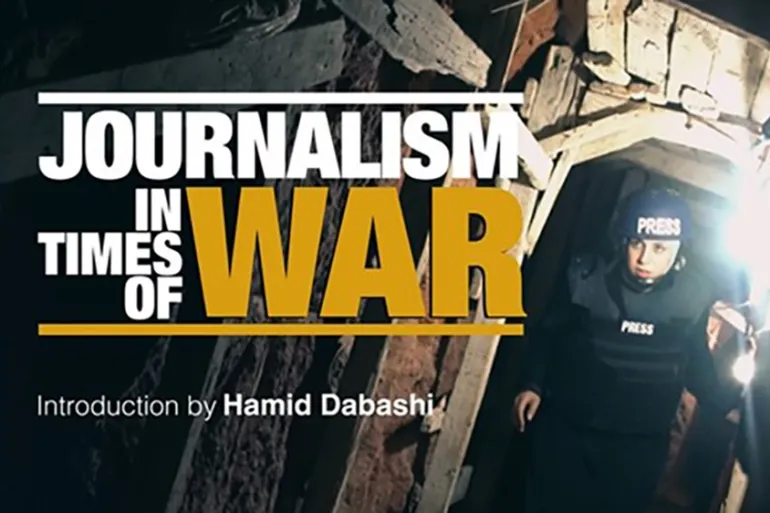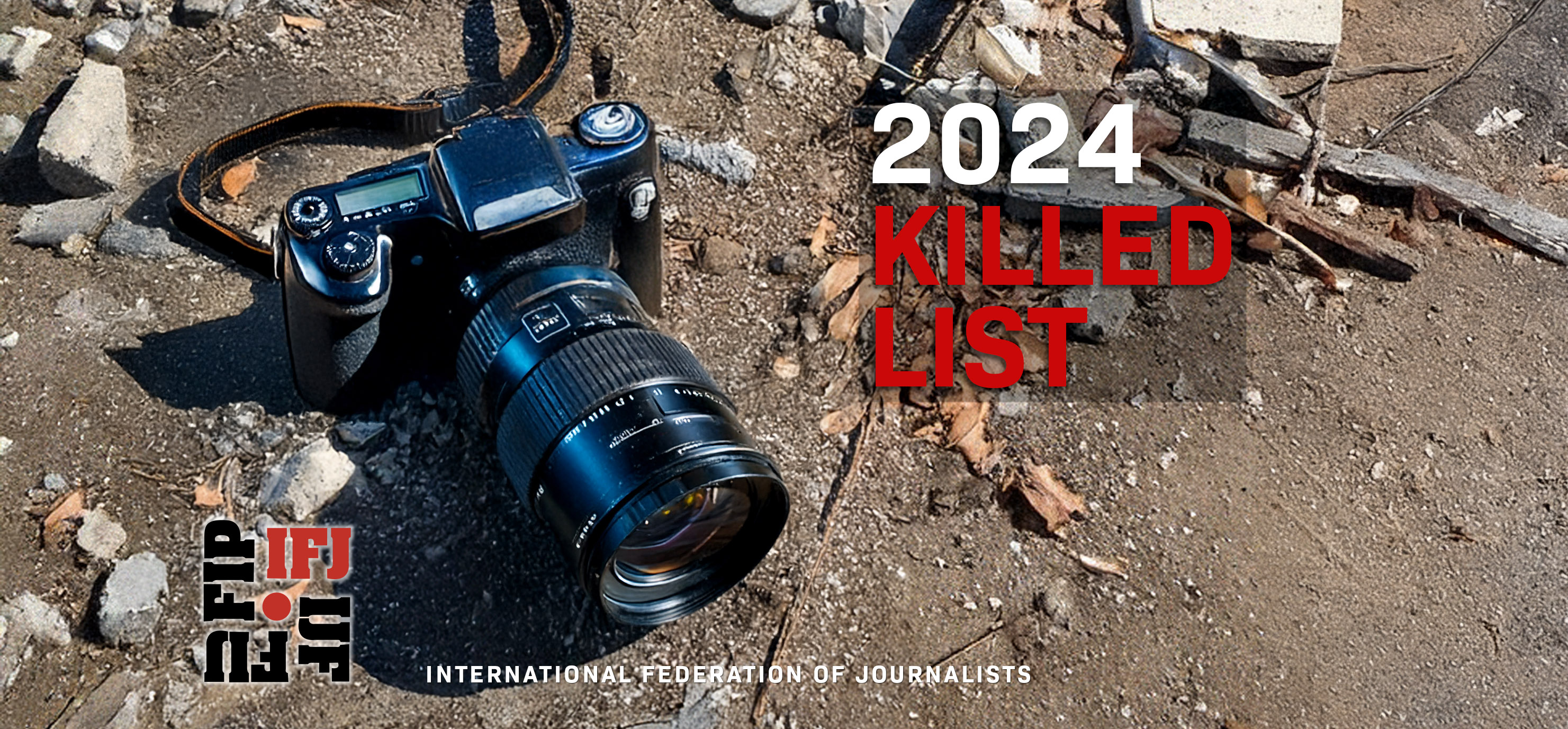
Journalism in Times of War
March 3, 2025
Escalating violent conflict in eastern DRC: journalists and HRDs targeted; censorship and internet cuts
March 7, 2025March 03, 2025 – Source: IFJ –
“This year marks one of the deadliest for journalists, with Palestine being by far the most dangerous country for the second year in a row. Despite our repeated calls and warnings, Israel has continued the massacre of journalists in Palestine, Lebanon, and Syria. Israel’s crimes against journalists must not remain unpunished,” said IFJ President Dominique Pradalié.
The mortality rate among journalists in the Middle East and the Arab World was terrible in 2024, reaching a total of 77. Most of these deaths were due to the war in Gaza, as well as in Lebanon. Yet we should also remember the many media professionals murdered elsewhere in the world in 2024: 22 journalists were killed in Asia-Pacific, ten in Africa, nine in the Americas, and four in Europe.
Below, the IFJ features the stories of five journalists from different regions. Their deaths illustrate the dangers faced by media professionals across the world. These are only five stories out of the 122 detailed in the report.
To download the publication in English, click here.
Americas, Mexico: Alejandro Martínez Noguez
Alejandro Martínez Noguez, 57, known as “El Hijo del Llanero Solitario”, in English Son of the Lone Ranger was a journalist in the state of Guanajuato, Mexico, recognised for his coverage of local crime and police stories. On 4 August 2024, unknown individuals shot and killed him while he was on the road, returning from reporting on a traffic accident near the town of Celaya. At the time of the attack, he was accompanied by armed police escorts, two of whom were injured. Although the crime is believed to be linked to the narco-trafficking activities often covered by the journalist, investigations to date have not made significant progress.
Martínez had already survived a previous attempt on his life in November 2022, when an unknown individual showed up at his home with a firearm. Following this attack, the journalist was assigned permanent police protection.
Africa, Sudan: Hanan Adam
Hanan Adam, a Sudanese journalist, was killed alongside her brother, Youssef Adam, when paramilitary Rapid Support Forces (RSF) stormed their home in Wad Al-Asha, al-Gezira state, on 8 December 2024. She was a correspondent for Al-Midan, a local Sudan Communist Party-affiliated newspaper, and was known for her reporting on the escalating violence in Sudan, where journalists have increasingly become targets.
Her assassination is part of a bigger crackdown on press freedom in Sudan, where at least six journalists were killed in 2024. This made it Africa’s deadliest country for reporters in 2024, according to the IFJ. The RSF, led by Mohamed Hamdan Dagalo, has been systematically targeting journalists, using violence to silence those documenting the war’s atrocities.
Asia-Pacific, Myanmar: Myat Thu Tan
Myat Thu Tan, also known as Phoe Thiha, was a journalist for the Democratic Voice of Burma – one of the country’s largest independent media organisations – and a contributor to online media outlet Western News, covering Myanmar’s civil war and the military junta’s oppression. He was arrested on 22 September 2022, for social media posts critical of the junta, and was detained without trial. On 31 January 2024, he was executed by two military personnel from Light Infantry Battalion 378 in Mrauk-U, Rakhine State. His body, along with six other political prisoners, was found in a bomb shelter after the ethnic armed organisation Arakan Army seized the camp on 5 February. Local media reports suggest they were tortured before being killed.
His murder highlights the junta’s brutal repression of journalists under Section 505(A) of Myanmar’s Penal Code, which criminalises dissent. The country remains one of the most dangerous places for journalists in the Asia-Pacific region.
Europe, Russia: Viktoria Roshchyna
Ukrainian journalist Viktoria Roshchyna, 27, died in Russian captivity on 19 September 2024, while being transferred from Taganrog pre-trial detention centre to Moscow as part of a prisoner exchange. Roshchyna was a freelance investigative journalist, working with Ukrainian media outlets such as Hromadske and Ukrainska Pravda. She covered politically sensitive topics, including trials of political prisoners, Russian military actions, and the stories of those affected by the war. She also reported on the war’s devastating impact on Ukrainian civilians in territories occupied by Russian forces.
Roshchyna had first been arrested for a week in 2022 on her way to report from Mariupol. In August 2023, the reporter went missing again while reporting in the Russian-occupied territory. For nearly 10 months, her family, colleagues, and the Ukrainian government had no confirmation of her location or condition. It was not until May 2024 that Russia’s Ministry of Defence confirmed Roshchyna’s detention, but there were no clear details on charges against her. On 10 October 2024, an official notification came from the Russian Ministry of Defence, stating that she had died during her transfer to Moscow. The circumstances of her death remain unknown, leaving her family with many unanswered questions.
Roshchyna’s death is not only a tragic loss for journalism, but also a reflection of the lack of protection that journalists endure in conflict zones. To date, the journalist’s body has not yet been repatriated.
Middle East and the Arab World, Palestine: Eman El-Shanti
Eman El-Shanti, 36, was a Palestinian journalist and broadcaster for Al-Aqsa Radio, killed on 11 December 2024, in an Israeli airstrike on the Al-Malash Tower residential building in Sheikh Radwan, Gaza City. The attack also killed her husband and three children. El-Shanti was the host of The Origin of the Story and contributed to Al Jazeera’s AJ+ platform, documenting the realities of life in Gaza. “Is it possible that we are still alive until now? … May God have mercy on the martyrs,” El-Shanti wrote on her Facebook page just three hours before the airstrike.
Her death is part of a broader pattern of violence against journalists in Gaza, where at least 152 Palestinian media professionals have been killed since the war started on 7 October 2023. Israel’s impunity in targeting reporters has made Palestine one of the most dangerous countries in the history of modern journalism. El-Shanti’s final message stands as a testament to the reality that Gaza’s journalists face.
IFJ President Dominique Pradalié said: “We urge the Member States of the United Nations to ensure the adoption of a dedicated international convention that would enhance the protection of journalists and increase pressure on states to hold the perpetrators and masterminds behind the killings of journalists accountable for their crimes.”
Download the report in English: here

